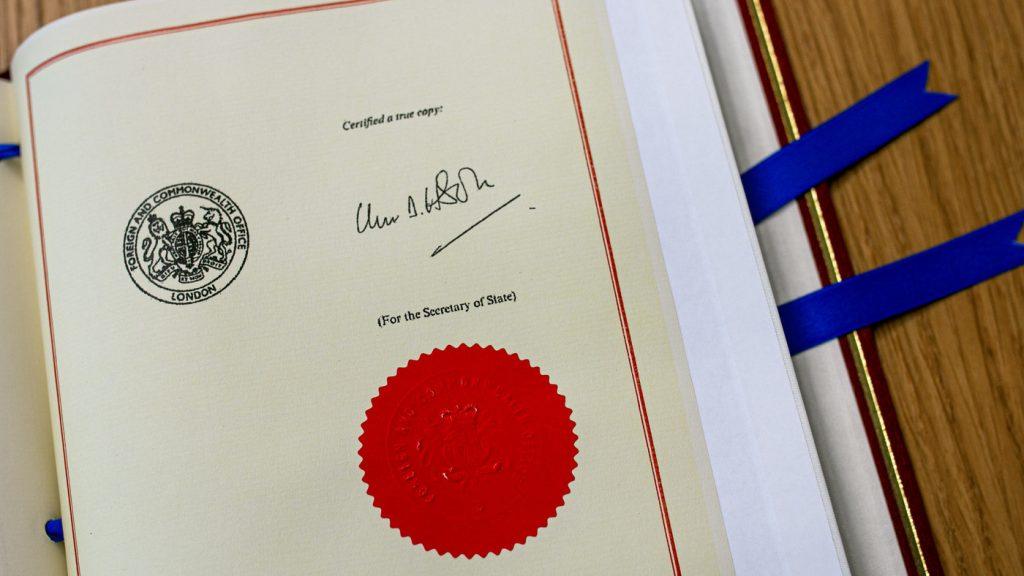SKA Observatory in final sprint before official launch

SKAO is the intergovernmental organisation responsible for building and operating the SKA telescopes, which together will form the world’s largest radio telescope and will enable scientists to study the universe in more detail than ever before.
The Convention stipulates that at least five nations, including the three host countries – Australia, South Africa and the UK – must ratify the text for it to enter into force. The UK’s ratification, following that of its two fellow host countries and founding members Italy, the Netherlands and Portugal, means SKAO can now formally be established.
The first meeting of the SKAO Council, the Observatory’s governing body representing Member States, is expected to take place in early 2021.
SKA in the UK
“The UK ratification is fantastic news and means SKAO can now enter into being as soon as January,” said SKA Director-General Prof. Philip Diamond. “It has been an exciting journey since the signature of the SKAO Convention in Rome in March 2019 but given the uncertainty that continues in the world around us, wrapping up the year on such a positive note and having the Observatory’s founding members solidifying their commitment to the SKA is extremely heartening.”
The UK hosts the SKA Global Headquarters, located at the historic Jodrell Bank Observatory in Cheshire, near Manchester. The £20million SKA HQ building, inaugurated in July 2019, was co-funded by the UK Government’s Department for Business, Energy and Industrial Strategy through the Science and Technology Facilities Council (STFC), The University of Manchester and Cheshire East Council.
Jodrell Bank, recognised as a UNESCO World Heritage Site in 2019 for its contributions to radio astronomy, is the central hub of the UK’s e-MERLIN national facility. This network of seven radio telescopes spread across the UK (including the iconic 76m Lovell Telescope) together form an SKA pathfinder instrument.
Science Minister Amanda Solloway said: “The ambition of the Square Kilometre Array is one of the most important scientific endeavours of our generation that could open up unprecedented opportunities for astronomers across the world.
“The UK is proudly home to the SKA headquarters and today’s milestone brings us one step closer to constructing these sophisticated telescopes that will enable our scientists to explore the universe in more detail than ever before – potentially expanding our knowledge of astronomy.”
Executive Chair of STFC Professor Mark Thomson said: “The Square Kilometre Array is one of the flagship international science facilities of this generation and I am delighted that the UK’s ratification of the Treaty means work towards the construction of this vast telescope array can proceed rapidly. This is an extremely important and exciting moment for astronomy.
“The SKA will help us to probe some of the fundamental questions about the origins of the Universe and, with this confirmation of UK government support, it is now down to the hard work of scientists in the UK and around to globe to provide vital technology and expertise to bring SKA to life.”
SKA on the ground
Scientists based at UK institutions make up 15% of members within the SKA’s Science Working Groups and Focus Groups and were the largest contributors of the SKA Science Book that was published in 2015.
The UK has also, supported by STFC, led the design and delivery of key elements of the SKA during the pre-construction phase of the telescopes through its university partners at the Universities of Cambridge, Manchester and Oxford, UK industry and STFC’s Daresbury Laboratory, Rutherford Appleton Laboratory and UK Astronomy Technology Centre.
This included leading the SKA’s international Science Data Processor and Signal and Data Transport engineering design consortia. UK institutions were also heavily involved in the SKA’s Telescope Manager software element and in the design process for the SKA’s low-frequency antennas.




